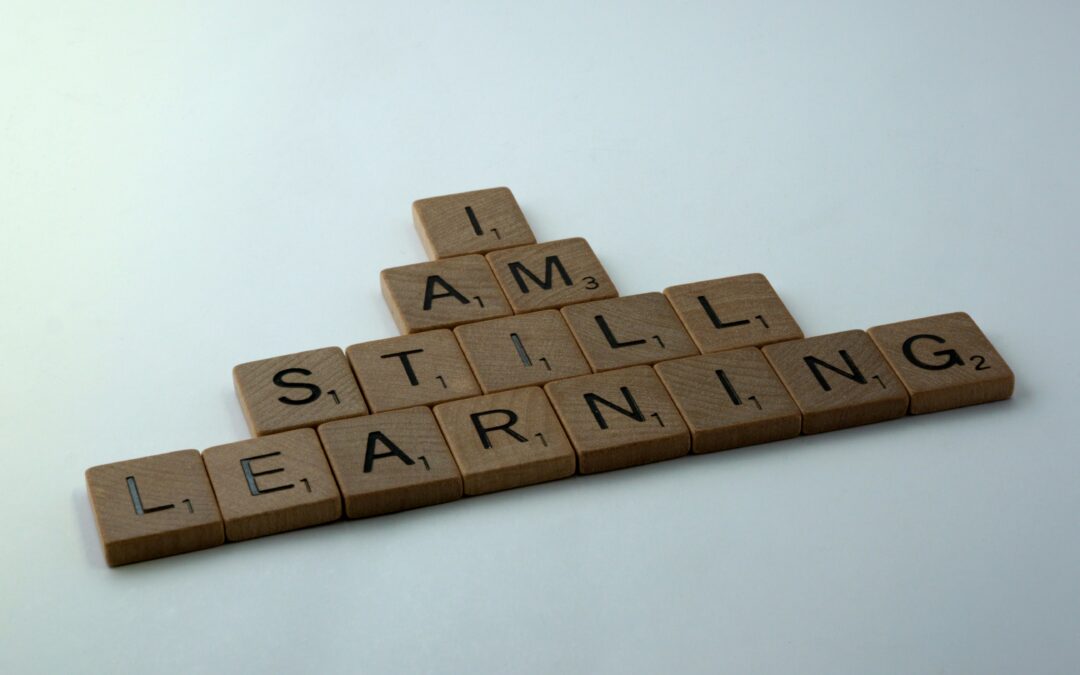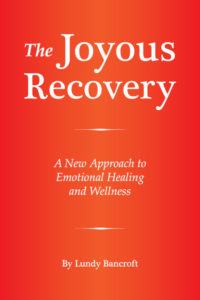
by Lundy Bancroft | Feb 15, 2024 | Innate Intelligence
There are a number of reasons why we can end up feeling stupid at times — or a lot of the time — none of which has anything to do with what the actual capabilities of our minds are. The two biggest causes are:
1) people telling us we’re stupid, and treating us as if it’s true
2) skipped steps in our learning process
In this post, I’m going to focus on the second cause. (I’ve written about cause #1 quite a bit, though there’s a ton that remains to be said about it.)
I’ll begin by explaining what I mean by “skipped steps.” All intellectual understanding — mental development, in other words — constantly involves building blocks that are stacked one on top of another. Grasping each new level is impossible to do well until we have a solid understanding of the previous level. Rushing forward doesn’t work.
I’ll give an example from math, partly because math is an area where so many people end up feeling that their minds don’t work right. One of the more common self-limiting beliefs that I hear is, “I simply can’t do math, I’m just terrible at it.” No, you could do it fine. You just weren’t taught properly.
To learn math you start by learning to count, then to add and subtract. Next you learn about negative numbers. Eventually it’s time to start adding and subtracting with negative numbers — and at this point things start to get dicey. You start facing problems like 3 – (-2) and -4 + (-2) , and at this point some kids are already starting to get nervous.
The thing is that it becomes important not just to get the right answer, but to be able to picture in your mind why it’s the right answer. Sure, you can solve 3 – (-2) (three minus negative two) correctly by memorizing the rules the teacher gives you; for example, if you see two minus signs in a row, turn it into a plus sign; so 3 – (-2) equals 3+2, which equals 5. But what happens is that if you get the correct answers through this kind of mechanical process, but with no real grasp of why, you end up feeling lost farther down the road when being able to picture math in your mind become important.
Unfortunately, a teacher with thirty students in her class can’t possibly keep tabs on whether all the students actually get what’s going on. That’s an impossible expectation of her, it’s not her fault. The best she can do is make sure as many kids as possible get the right answers, and then just hope that some of them actually followed the reasoning behind it.
Let’s continue forward. The next year these students are starting to multiply and divide — and soon are trying to do that with negative numbers. And what happens is that the kids who struggled with adding and subtracting negative numbers are starting to feel stupid. And even some of the kids who knew how to get the right answers last year feel like they’re faking it, because they kind of are.
At this point, math anxiety starts to develop in many kids; they’re starting to panic because they know they’re supposed to understand what’s going on, but they don’t, so they’re trying to fake it as well as they can. And they’re praying that they get enough correct answers to avoid humiliating themselves, Many kids become secretive about what they don’t understand, not admitting it to peers or to adults in order to avoid feeling put-down. Meanwhile they’re internalizing the belief that their minds don’t work right.
Even the kids who have the courage to say, “I just don’t get this,” don’t typically get the help that they need, and they may come to regret having spoken up. The adults start to feel impatient with them and start to suspect that they “just don’t have an aptitude for math.”
There’s nobody really at fault here, except for the high-level policymakers and powerful people who are making it necessary to have thirty kids in a class. Most adults don’t realize that there’s no such thing as a stupid kid, there are just missed steps. It’s up to the adults to figure out which steps got missed and then to go back and fill in the gaps — but this doesn’t often happen. (And even those adults who do recognize the problem may not have the time or the resources to attend to it, the overworked teacher being the prime example.)

I used to do some tutoring in math, and I saw the huge harm done to people’s belief in their own intelligence because of steps that had been skipped. The adult world had completely failed to notice that some of the kid’s building blocks were way askew, and so couldn’t understand why his or her towers kept toppling over. I kept having to say to people, “You’re perfectly capable of doing this math, we just have to cover some earlier stuff first and really pin it down. Then you’ll be fine.”
There is nothing you aren’t capable of learning, whether it’s a new language, a musical instrument, or particle physics. The learning process just has to be broken down into proper steps, starting from the beginning, and the learning has to be guided by teachers who can speak plainly and who aren’t in a rush. And the teachers have to believe you’re capable of learning; if they believe it, they’ll be right.
There are very few geniuses in the world. Geniuses can skip all kinds of steps in a learning process. But the rest of us, the vast majority of the human race, are perfectly smart and capable, we just have to have each building block solidly in place before we can pile the next one on top of it.
Part of the problem is that most teachers, and most writers of books, know so much about their subject that they’ve forgotten what it was like back when they knew very little. Many of the early concepts have become totally obvious to them, so they forget what it was like to be learning the material for the first time. This means in turn that they forget that each concept needs to be broken down into manageable bits; they just feel like, “Why don’t you get this instantly — it’s plain as day!” And to them it is indeed plain as day — but it wasn’t always!
I love to learn music theory — all about chords, scales, melody, and harmony. But every music theory book I’ve read contains at least a few sections that are incomprehensible to me. The writer failed to think through in his or her mind, “How does this concept need to be explained to someone who has never encountered it before?” I find this to be true of virtually every book that strives to teach any subject in the world. Very few writers seem to fully grasp how information is absorbed by someone who is new to an idea.
And when we find a book or a video that’s been put together by someone who is really putting themselves in the position of the learner, really looking at things through our eyes, it’s so wonderful! That level of clarity is entirely possible, and it makes the learner feel smart and capable instead of anxious and clumsy.
You most likely have no interest in learning particle physics, and that’s perfectly fine. My point is that whatever it is that you’d like to learn, stop believing that you can’t do it. Of course you can’t understand it yet — you can’t skip to the end. Start at the beginning and then advocate for yourself; demand patient assistance, insist on written and video materials that actually make sense, and make sure you know all the necessary concepts for going up to the next level before you try to advance.
And if you’re trying to learn something that you’ve failed at in the past, make sure to do it differently this time; don’t set yourself up to be self-blaming again. And doing it differently includes looking carefully at the question of what steps you might have missed on prior attempts.
I’ll finish with an example from my recent life. I grew up playing baseball, and I’ve been back to playing competitive league ball now for almost a decade. But three or four weeks ago a private baseball coach that I’ve hired taught me how to throw a ball. I’m absolutely serious. He showed me basic mechanics that someone should have taught me when I was eight years old — my parents had zero interest in baseball, and it never occurred to our Peewee League coaches that they should perhaps break down the movements involved in throwing. So no one had ever taught me. And I’d gotten by okay all these years, but have never been able to throw as far as most other competitive players can, and have had struggles with my throwing shoulder.
Working with my private coach the other day, I made the longest throws I’ve made in my life — I measured them. So don’t be afraid to start back at the beginning; it’s often the best way to learn.
Photo by Brett Jordan on Unsplash (Scrabble blocks)
Photo by Gaelle Marcel on Unsplash (reader on pile of books)

by Lundy Bancroft | Dec 17, 2020 | Peak Living Network, The Joyous Recovery
This is how brainwashing works.
There’s one aspect of indoctrination that people commonly understand, and one aspect that they mostly miss. The first aspect is repetition and relentlessness. The person or institution doing the brainwashing makes sure that you hear their central messages over and over and over again, every day or even every hour (repetition), while also working hard to keep you from ever hearing alternate viewpoints (relentlessness), especially ones that might support or confirm your independent thinking, your sense of what’s real.
But the second aspect, just as central to how brainwashing works, is mistreatment. When someone is being indoctrinated, they’re not just subjected to constant lies, they also get traumatized, typically through tactics such as deprivation of food, water, sleep, and movement, brutal verbal abuse, scary threats to self or loved ones, and physical or sexual assault. This trauma tears down our defenses and makes us much more vulnerable to the lies; without the trauma, we would mostly see through the lies and reject them.
Survivors of abuse sometimes get criticized for having believed the lies told by a cruel parent or partner; judgmental people may say, for example, “Why would you believe someone who was so abusive to you?” At times this is also a voice inside the abuse survivor’s own head.
But it’s precisely because of the abuse that the lies get so powerful and so successful. If the abusive person weren’t messing so badly with your emotions, you’d notice that they were messing with your mind, and you’d be able to keep your clarity. Try to stop blaming yourself for having believed.


by Lundy Bancroft | Nov 22, 2019 | Peak Living Network, Co-Counseling, The Joyous Recovery
Fourteen people gathered at a lovely retreat center outside of Edmonton, Alberta for the weekend of November 15-17, nine Canadians and five Americans. We did “Co-Counseling and Community Building, Level 1,” the same training that I gave to 30 people in NY state in August.
This training had a key difference from the last one, which was that roughly half the participants were from the local area, and they had various connections to each other prior to the weekend. They had already started building a support network and were eager to bring PLN skills and principles into their approach to supporting each other. These folks will have the luxury of not having to go home and build a local PLN network from scratch; they already have their core group and now they’ve all had two full days of intensive training.

The training participants were such a lovely group of women; caring, outspoken, sticking up for each other, fiery, fighting for their kids, big hearts, willing to take risks. I am carrying these awesome people around inside me and feeling buoyed by them in the days that have passed since the training.
I want to share some specific thoughts I have as I reflect back on the weekend:
* I’d like to see everybody in the Peak Living Network make a list of all the things you can think of that the world needs that you have to offer. Some things on the list might be skills or knowledge you could share, and others might be personal qualities you have that the rest of us could benefit from.
When you first start making the list you may have trouble coming up with ideas; most of us have been invalidated a lot over the course of our lives, so we underestimate what our abilities and positive qualities are. You might also run into a message in your head telling you not to say (or even think) positive things about yourself because that would be conceited. Try to push past those injuries and those negative voices and start building a list.
I explained at the training that it’s false to think of some people as “the leader type” and other people as “not the leader type.” Everyone has important leadership to share in some aspect of life, and one of the missions of PLN is to help everyone develop their leadership skills.

* Learning to co-counsel is challenging, not because it involves any hard-to-attain skills but because it requires breaking a number of long-standing habits. The hardest parts seem to be: 1) Breaking the habit of switching the subject back to ourselves when it’s the other person’s turn, and 2) Breaking the habit of making reference to things the person said during their counseling turn after their turn is over. We’ll need to find ways to frequently remind ourselves and each other of these principles.
As happened at the August training, several people commented that they were already starting to feel the power of co-counseling. This is all the more reason to do it with commitment and discipline, because its power depends on those things.

* People are reporting that they get messages in life, from a number of different directions, that say that it’s unrealistic to expect or hope for very much healing. Society seems to be rife with the outlook that things inside of us can only improve a little, and even that can only happen with a tremendous amount of hard work. Some people reported getting this message even from their therapists. So we need to put our passion into this movement and help people believe – and experience – what a huge healing potential we all have.
Photos from Unsplash, top to bottom:
Jens Johnsson, Greg Raines, Maxime Bhm

by Lundy Bancroft | Jul 30, 2019 | Working Through Anger, Co-Counseling, The Joyous Recovery
Today I’m offering a collection of strategies for successfully releasing anger. Anger, and more specifically how to work through it, is one three or four topics that I receive the most questions about. So I know that many people struggle with carrying a lot of anger and rage around inside them and don’t know how to relieve it.
Two key opening points about anger release:
1) The release needs to be quite physical in order to work.
2) You need to be feeling powerful while you release it, or at least not completely powerless, or the anger won’t get out.
With respect to my second point above, many people spend hours screaming and yelling without feeling any relief from their anger, and that’s because they are feeling too isolated and too powerless while they’re doing it.
There can also be one other reason why they aren’t getting relief: because they’re screaming and yelling at actual people, instead of working on releasing their anger. Running your anger at other people — which may be necessary sometimes in order to stand up for yourself — won’t ever relieve it. I’m not entirely sure why this is true, but it’s easy to observe in practice. For anger to successfully get out, you have to release it alone or, even better, with a support person accompanying and encouraging you.
As always when you’re trying to work through deep emotions, I recommend working with a partner if possible. You may be able to release anger successfully alone if you are feeling generally well-supported in your life in the current period. In other words, if you can picture a specific person being with you, someone whom you feel close to and whom you trust, that may work well enough if they can’t be with you in person at the moment. Having someone with you on the phone is another good option to pursue rather than being alone.

Here are some ways to help yourself feel powerful so that you can release anger:
1) Stand up tall, take a powerful stance (feet at least shoulder width apart), hold your head high but your chin in, which radiates the most confidence.
2) Use a voice that is strong and powerful, not screechy or whiny. Try to sound like someone who is giving orders, not someone who is pleading or begging.
3) Stomp on a pillow or cushion, or pound cushions on a couch or bed. Another great device is a plastic baseball bat that you can hit things with (without harming anything). Speak loudly and forcefully while you pound, but don’t yell your loudest or scream — not because there’s anything wrong with doing so, but because ironically doing so tends to make us feel less powerful, not more so.
4) If you are working with a co-counseling partner, take frequent quick breaks to make eye contact with your counselor and take in the fact that s/he is there. Keep absorbing the person’s support and caring.
5) Ask for reassurance periodically if you need it. When we’re releasing anger, we often feel ashamed or embarrassed about doing so, or feel that it looks kind of ugly. These barriers can be even greater for women than for men, so keep checking in with your co-counselor to see that s/he is still approving of you and accompanying you.
6) Imagine that the person you’re enraged at is present in the room, and direct your anger at that image. (It might be multiple people.)
You might also try spewing your anger at your co-counselor as if s/he was the person you’re angry at, rather than directing it toward an imaginary person in the room. I don’t recommend, however, having your co-counselor actually play the role of that person, which can rapidly become overwhelming for you (because then there’s no one in the room being your safe person). So it’s fine to have your counselor be a stand-in for someone else, but s/he should still continue to act like herself, smiling at you and encouraging you as you blast out your rage.
7) Keep the words simple, and say them over and over again with great force. This technique tends to work much better for releasing anger than giving a speech about all the things you’re angry about. Choose one or two short phrases (perhaps things like “Get away from me!” or “Don’t even think you can get away with that!” or “F*** you!”) to use repeatedly.
8) It often works best to use a phrase that goes against what actually happened; for example, you might try yelling “You can’t get away with this!” at someone who actually did get away with what they did to you at the time. This contradictory-seeming approach will tend to release anger more successfully, as it will help you feel more powerful in the present. Try it.
9) Follow on into other feelings that come up. When anger is successfully getting out, it will commonly lead to moments of crying or laughing, or even of cycling between laughing, crying, and angry storming.
10) Take pride in your outrage. You are right to feel enraged and bitter in the face of the injustices you’ve experienced. You of course need relief from your anger because it’s eating you up inside, but that doesn’t mean there’s anything wrong with you for how angry you are; anger is only an unhealthy reaction when it’s used by violent or abusive people to frighten or control others. This tends to be especially important for women, who’ve been societally conditioned to feel that their anger is ugly.

11) If you are doing this work by yourself, keep giving yourself encouragement (“Go for it! Don’t hold back! Fight hard!”) just the way a co-counselor would do for you. And keep picturing your close people — whoever they are at this point in your life — and imagine that they’re present with you and rooting for you.
12) As always when doing deep emotional work, take plenty of time at the end to bring yourself out of the painful feelings into positive awareness and into looking forward to the rest of your day, ideally doing so with the support of a co-counseling partner.
One final point: Some people — and this is particularly common with men but is also sometimes true of women — don’t really need to be discharging anger at all, at least for the time being. For those people, the anger they’re feeling day to day is primarily a layer of deep frustration, which is different from true anger, and tends most commonly to be cover for unshed tears. These people need to focus much more on getting their laughing and crying channels opened up and then spend a lot of time working on those kinds of feelings. This is why it’s important to follow your feelings wherever they take you, and don’t try to control the process.
(* I put a shorter version of this post up on the PLN blog as well. *)
Photo credits from the top:
Photo by Etty Fidele on Unsplash
Photo by Egor Barmin on Unsplash
Photo by Alex Iby on Unsplash

by Lundy Bancroft | May 23, 2019 | Peak Living Network
The most popular and visible approaches to emotional recovery — the philosophies typically promoted in commercial self-help and personal growth books and websites — are making numerous errors. One of the most common and problematic mistakes is their tendency to spread rigid, inflexible thinking. They claim that these rigidities will free us, but in fact what we’re trying to liberate ourselves from is rigidity itself. Emotional wounds cause us to become inflexible — in our bodies, in our emotions, and in our thinking — and emotional healing helps us to regain our suppleness in all three of those areas.
Here are some examples of the false dichotomies we get taught:
Either
you “focus on the positive” and “stop allowing your distress to have any power”
or
you spend time feeling your emotions and processing them (which, according to many philosophies, means that we’ll sink into self-pity, wallow in our painful emotions, and spend our lives in pointless ruminating)
Either
you find other people to love you
or
you learn to love yourself (which, they seem to be saying, means that you stop needing love from anyone else)
Either
you accept the world as it is
or
you don’t accept it, so you try to change it (and the message here seems to be that if you don’t accept the world as it is, you’ll live constantly unhappy about the state that it’s in)
Either
you look to people to rescue you
or
you take charge of your own life (which apparently means you stop needing anyone’s help)
These are all false choices; you don’t actually have to select between the two things in each of the examples above. In fact, the effort to make these rigid choices slows our healing rather than speeding it up.
Why? Because we need all of these elements in our lives. Successful emotional healing only comes if we attend to them all.
What does this mean in practice? It means that some days we need to be tough, and other days we need to recognize that it’s a bad day to fight and just let ourselves fall apart. (Yes, we need times of melting down.) Some days we’re all we need, and other days we really need support, companionship, and encouragement. Some days we need to live with the world as it is and let the rest go, and other days we need to be right up in the world’s face, demanding justice and demanding change. Some days we need to be taking care of other people, and some days we need them to take care of us — including times when we could really use a rescue, thank you very much.
Yes, it’s a dead end to stumble through life constantly looking to other people to rescue us. But it’s equally a dead end to decide we’re not going to rely on anyone, or to pretend that we’re never desperate.
Vibrant health and healing come from learning to move and shift, some weeks going one way and some weeks going the other, challenging ourselves to grow in one direction today and in a different direction tomorrow. This spring may be my time to kick some asses and this summer may be my time to curl up in a ball while a loved one strokes my head.
Rigid thinking has to be left behind and replaced with flexibility. Emotional healing helps us to regain smooth and comfortable — yet solid — motion in our bodies, our emotions, and our thinking. And that flexibility in turn helps us go toward further and deeper healing.
Lundy’s new book is The Joyous Recovery: A New Approach to Emotional Healing and Wellness.














